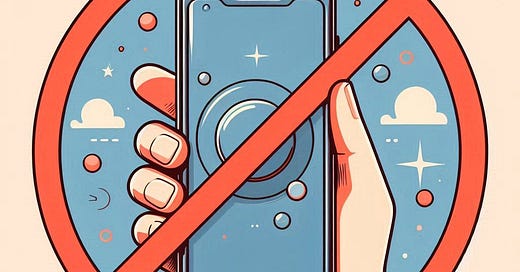Not Again! Cell Phones!
It’s time for a vote. Board members need to go on record and show which side of history they choose to be on - the side of learning, or the side of a terribly misguided understanding of statistics.
I promise this is the last article I’m going to write on cell phones in Decatur Public Schools. Cell phone articles in the media peak every now and then when a study comes out, and in February a new, very large, and excellent study comprising over 400 middle schools in Norway (schools not students!) was published and compels me to write one last time. But first, from NPR, here’s a quick update on where we are…
As of April 2024, Indiana has a law that bans cell phones and other wireless devices during class time in all public and charter schools. Florida was the first state to pass a similar law in July 2023, which requires all public schools to ban phones during class and block social media on district Wi-Fi. Kentucky, Vermont, Tennessee and Kansas are considering a similar ban. Supporters say the laws reduce distractions in the classroom, cut down on bullying through social media and encourage more in-person interaction.
The Norwegian Institute of Public Health studied what happened to school kids in Norway when cell phones were banned and found that, among other things, "banning smartphones reduces the number of consultations for psychological symptoms and diseases at specialist care... by almost 60%." And additionally, that "girls exposed to a smartphone ban from the start of middle school make gains in GPA, average grades set by teachers, and externally graded mathematics exams. Post-ban girls gain 0.08 standard deviations in GPA, and 0.09 standard deviations in teacher-awarded grades and have 0.22 standard deviations higher mathematics test scores compared to girls not exposed to a ban". The study also mentions, “These important differences suggest that unstructured technology is especially distracting for learning and impacts mental health to a larger extent for students from low socioeconomic families”. These are very significant results and are way too important to be ignored.
So, in the interest of keeping this short, I won’t elaborate more on the study’s results (you can read more following the link above, if you want) but instead I’ll jump straight into addressing the common objections to a cell phone ban:
My child needs a phone to get in touch with me in case of a school shooting.
First, the use of a cell phone will only slow a child and the rest of the school down in the case of an active shooter. I would rather my child not use their cell phone if there is a shooter in the school. But more importantly, the odds of a child dying in a school shooting are less than 1 in a million. Compare that with the odds of a child dying from suicide: 3 in a million for kids aged 5-12, and 70 in a million for ages 13-18! Do you see the huge differences in those numbers? Given the substantial deleterious effects on the mental health of Middle School students recognized in the Norway study, shouldn’t mental health concerns take a correspondingly huge precedence in our decision making of what we can and should do to help our kids?Kids need to keep up with technology, and cell phone use in school is important for this function.
This is almost too laughable to address, but… There is way too much technology in schools already. We already have computers and iPads in the classroom – do we need more? Heck, there are schools all over the world, even ones famously in Silicon Valley, that are not only banning cell phones but banning all technology in the classroom. And isn’t there enough time outside of class for kids to learn tech (wink, wink) from their phones?
Banning phones in the classroom will also help with another problem we have in district 61 schools: teacher retention. One of the largest sources of frustration for most middle and high school teachers is student cell phone usage. If the administration needs more evidence that a ban would help they could take a random sample of high school teachers (statistical note: we don’t need to poll all the teachers; a well-designed random sample will suffice) and ask them two questions:
Do cell phones detract from learning in the classroom? And,
If the burden to enforce a cell phone ban was not placed on the teachers, would you be in favor of a classroom cell phone ban? (For example, phones must be kept in lockers and can only be accessed in the short time between classes.)
I would be interested to see the results, but I’m confident they would overwhelmingly show that nearly every teacher believes phones are a distraction, and that they would indeed be in favor of a ban.
Finally, since Duane and I don’t like to complain without offering a plan, here is ours: completely ban cell phones from the classroom – if a student brings a phone into class they are out of that class for the day. The phones can come to school, but must be placed in the student’s locker, or other appropriate out of the classroom location. (Do not use locked bags, or classroom cubbies, as those systems can be gamed with secondary phones, and force teachers into awkward decisions.)
So, here’s my plea to the School Board: vote now, or before the end of the school year, so we are ready for an August back-to-school without cell phones. And don’t wait till you think we’ll have a unanimous vote. In fact, I hope the vote isn’t unanimous because many of us want to know who to vote for in the next election.




Mike, I will support your suggestions at today’s meeting and fight to get cell phones out of the classrooms.